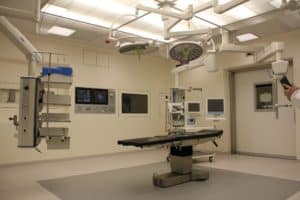It seems like surgical centers end up in the news just about every day for a number of reasons. Lately, this has been due to their expansion. Surgical centers – outpatient locations where patients can receive orthopedic surgery and other “simpler” procedures – are becoming increasingly popular. Why? Well, many surgical procedures have been simplified due to modern technology. On top of this, the commercial health insurance companies prefer these types of procedures, because they come with fewer complications and shorter hospital stints. However, there are a few issues that the people running these centers need to contend with, particularly billing issues. It’s pretty common for these claims to end up going through the state level appeals process.
The Popularity of Surgical Centers Leads to Additional Growth
Some of the proof of the growth of these surgical centers comes from one of the companies that manufacture equipment for them. One of these manufacturers, Intuitive Surgical, expanded late last year, taking over two additional buildings in Santa Clara, California. This particular company is represented by a “flagship product [called] the da Vinci Surgical System, which enables physicians to perform robot-assisted surgery using a remote console.” Some interesting statistics include the fact that “Worldwide da Vinci procedures grew approximately 19 percent year-over-year in the fourth quarter of 2018, Intuitive Surgical reported. The company shipped 290 da Vinci Surgical Systems.” In addition, the companies’ “fourth-quarter revenue was $1.047 billion, up about 17 percent from the same quarter in 2017.”
Plus, a company that tracks data for these surgical centers has expanded as well. This company, ORHUB, exists to help these centers stay profitable. According to them, “We are extremely delighted to add experienced healthcare sales representatives and distributors to the team, who are already tackling over 10,000 hospitals and ASCs in the U.S.,” said ORHub CEO Colt Melby. “By adding powerful resources to the national sales effort, we expect to gain market share much more quickly.” While they can help these centers make more money by selling additional procedures (within reason, of course), they cannot help when it comes to standard claims collection and general billing issues. This is where things can go south fairly quickly, since all of the equipment and salespeople in the world may not help when the commercial health insurance companies don’t pay their claims on time.
Billing Issues Abound At Surgical Centers
Like with most billing departments, the ones at these surgical centers have a number of codes that they need to keep track of. Every commercial health insurance company has a contract with the surgical center. This information includes how much the surgical center can bill for certain procedures, as well as how those claims are sent in. Most are sent electronically to the insurance companies, making it easy to track them. The problem comes when mistakes are made in the billing process. Sometimes things end up getting miscoded, or the wrong amount is requested. When those claims are sent back to the surgical center, it’s up to the billing employees to double-check them and then resubmit them. This resubmission is the first of their state-level appeals. Only three are allowed.
In most cases (as you can see from the statistics included above) most claims are paid by the end of the three appeals. The problem comes when they aren’t. No matter the reason for the unpaid or underpaid commercial health insurance claims, these finished appeals can cause a number of problems.
How The State Level Appeals Process Works
Every surgical center has three state-level appeals that they go through when trying to collect on a commercial health insurance plan. The ways in which the appeals are done depends on the insurance company itself. Every one of them has a different form, another process, and sometimes a separate address that those claims need to be sent to. This just makes it more difficult for the surgical center’s billing employees. They need to know the specifics and have enough time to deal with each round of appeals. There’s usually a lot of paperwork involved. What makes this even trickier is the time frame.
According to the statistics in Becker’s most of these claims are sent out for payment within three days of the surgery. The time that it takes to wade through the codes and billing documents to find the correct forms is what generally leads to these delays. Without those specifics, the process would move much faster. It gets even worse when you consider what happens when those claims are sent back unpaid or underpaid. You only receive three state-level appeals on these claims before they end up being shelved for good. At that point, they end up in what we call a debt bucket, on the wrong side of the balance sheet. If those add up enough – and the rate of fully paid claims begins to fall precipitously – then your surgical center ends up in financial hot water.
Over Time, Unpaid Claims Cause Cash Flow Problems
Surgical centers have quite a few bills to pay, including the surgeons and supporting doctors and nurses, their utilities, any building maintenance and upkeep, and necessary supplies. Without a cash flow that consists of 100% paid claims, your surgical center could end up in financial trouble. There’s also the issue of the “boom period” that surgical centers are in. The need and market for them could end up shrinking, making these unpaid claims even more important.
The Federal ERISA Process Can Solve This Problem
Thankfully, there’s an option when it comes to those rejected surgical center claims – the Federal ERISA appeals process. ERISA, also known as the Employee Retirement Income Security Act, is a method used by specialists to ensure that those commercial healthcare claims get paid. According to ERISA, which was created to govern employee retirement plans and then expanded to include self-paid health insurance, those unpaid commercial healthcare claims must be paid. However, this is a specialized and time-consuming process.
The main issue is that the surgical center billing employees don’t have the time to go through the Federal ERISA appeals process. These billing employees more than likely don’t know how even to begin such an appeal, nor do they have access to complete the paperwork and follow up on them. They’re too busy sending out bills for current claims, as well as dealing with those that are in still working through the state level process. All of that money – which these surgical centers really could use – is going uncollected. You need us, ERISA Recovery, to handle the Federal ERISA appeals for you. We don’t require any payment up front and even have a 12-month $1 million guarantee. To be specific, we guarantee that we’ll collect $1 million in claims for you over a 12-month period, as long as we have access to the information that we need.
You Need An Expert
It’s time for you to take control of your surgical center’s financial future. You need to ensure that your collection rate from commercial health insurance companies is 100%. This is why you need to contact ERISA Recovery today so that we can help put the Federal ERISA appeals process in motion. You can reach us at (972) 331-4140 or by filling out the contact form on our website.






